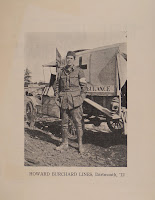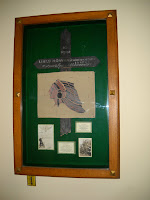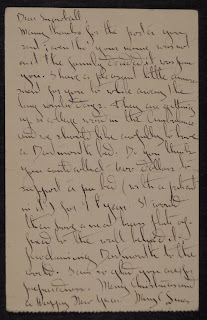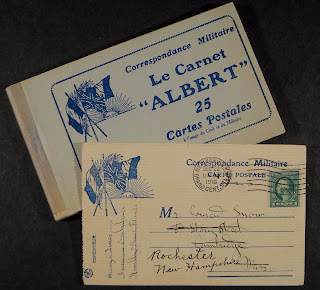 At the bottom of the Baker Library west stairwell, down in the basement, behind a propped open door, is a memorial that often goes unnoticed. It commemorates the service of Howard “Rainy” Burchard Lines, 1912.
At the bottom of the Baker Library west stairwell, down in the basement, behind a propped open door, is a memorial that often goes unnoticed. It commemorates the service of Howard “Rainy” Burchard Lines, 1912.After graduating from Dartmouth, Lines went on to attend Harvard Law School. When the First World War broke out it was all his friends and family could do to persuade him to finish his studies. Upon graduating from Harvard, he joined the American Ambulance Field Service (a medical service run by American volunteers) in France. From September to December 1915 he drove a Model T Ford Ambulance ferrying wounded French Soldiers from the front to a field hospital.
 |
| Lines Memorial in Baker Library |
In the spring of 1916 Lines was taken ill with appendicitis and was operated on a second time for an abdominal injury received from lifting wounded soldiers. He returned to service in September of 1916. In November he wrote to his friend and classmate Conrad Snow, 1912, still at Harvard, “I left Paris the middle of September at the helm of a three ton White truck with a trailer consisting of a completely equipped field kitchen. Toured France more or less thoroughly and managed to keep from sideswiping anything although the trailer had several narrow shaves.” He went on to describe his billets:
We are right on the edge of some wooded foothills and work two posts. The rest of the time there is some evacuation work but on the whole about a quarter of the cars can handle a day’s work. Our living quarters while by no means luxurious, are quite comfortable and a little ingenuity has done a lot towards covering up the worst and making the best out of the rest. I wish you could drop in and see us for our comfort goes the whole length and we have tea in the afternoon!
 |  |
| Lines post to Snow, December 22, 1916 | Lines post to Snow with postcard packet from which it was removed |
Soon after writing this letter Lines came down with a cold that developed into pneumonia. On December 22nd he wrote to Snow again, asking him to raise money for a hospital bed.
Dear Snowball,
Many thanks for the poster you sent; even tho’ your name was not on it the family decided it was from you. I have a pleasant little amusement for you to while away the long winter days. They are getting us a college ward in the Ambulance and we should like awfully to have a Dartmouth bed. Do you think you could collect 600 Dollars to support a bed (with a patient in it) for 1 fl. year It would then have a neat brass plate affixed to the wall behind it proclaiming Dartmouth to the world. I am so glad you are for preparedness. Merry Christmas and a happy New Year, Rainy C. Lines.
Lines posted the card, but died the next day. Snow followed Lines’s last wish and solicited his class. He had no trouble raising the $600 in memory of his friend and classmate. The French Government awarded Lines the Croix de Guerre posthumously in honor of his service.
 |
| The Dartmouth hospital bed (left) donated in Lines memory and one (right) donated by Lines parents |
- The Conrad E. Snow papers, MS-942
- Material relating to the American Ambulance Field Service in World War I, 1914?-1922, n.p., MS-452
- The papers of George French Ingalls, MS-574
- The papers of George Dock, Jr., MS-1057
- Photograph albums of the Dartmouth ambulance unit in World War I, 1917-1919, Rauner DC History D629.U8 F87
- The Letters of an Ambulance Driver, by Edward Chase Kirkland Rauner Alumni K635l
The "American Ambulance Field Service" is now called American Field Service (AFS) and is a very active organization promoting international understanding and exchanges throughout the world. After WWII it promoted high school student exchanges between the US and the rest of the world. Today, local AFS organizations in many countries continue this work promoting not only exchanges of high school students but also of professionals in many areas. All AFSers are very familiar with the story of the ambulance drivers of WW1 and their services to humanity. In 1958 I was one of 150 German high school students who were invited by AFS to spend a year with an American family and attend an American high school during their senior year. It was an experience that had a significant impact on my life.
ReplyDelete